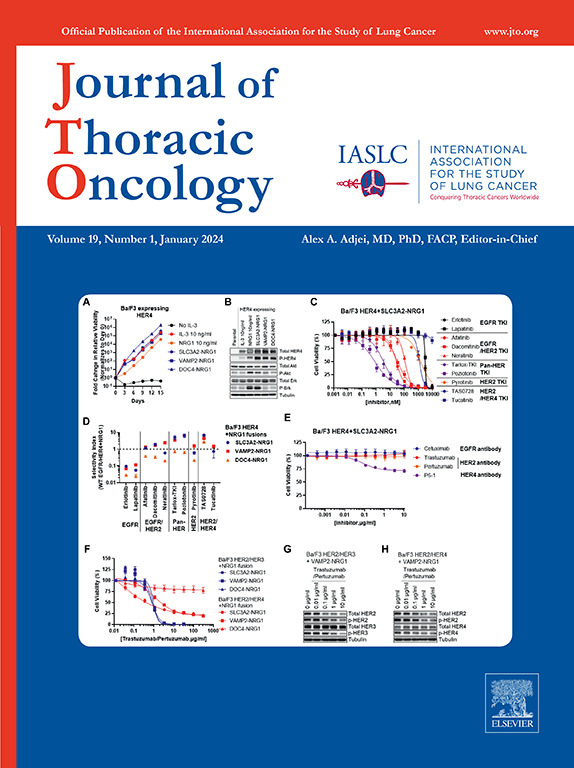Amivantamab Plus Lazertinib in Patients With EGFR-Mutant NSCLC After Progression on Osimertinib and Platinum-Based Chemotherapy: Results From CHRYSALIS-2 Cohort A
IF 20.8
1区 医学
Q1 ONCOLOGY
引用次数: 0
Abstract
Introduction
Treatment options for patients with EGFR-mutated NSCLC with disease progression on or after osimertinib and platinum-based chemotherapy are limited.
Methods
CHRYSALIS-2 cohort A evaluated amivantamab plus lazertinib in patients with EGFR exon 19 deletion- or L858R-mutated NSCLC with disease progression on or after osimertinib and platinum-based chemotherapy. Primary end point was investigator-assessed objective response rate (ORR). The patients received 1050 mg of intravenous amivantamab (1400 mg if ≥ 80 kg) plus 240 mg of oral lazertinib.
Results
In cohort A (N = 162), the investigator-assessed ORR was 28% (95% confidence interval [CI]: 22–36). The blinded independent central review–assessed ORR was 35% (95% CI: 27–42), with a median duration of response of 8.3 months (95% CI: 6.7–10.9) and a clinical benefit rate of 58% (95% CI: 50–66). At a median follow-up of 12 months, 32 of 56 responders (57%) achieved a duration of response of more than or equal to 6 months. Median progression-free survival by blinded independent central review was 4.5 months (95% CI: 4.1–5.8); median overall survival was 14.8 months (95% CI: 12.2–18.0). Preliminary evidence of central nervous system antitumor activity was reported in seven patients with baseline brain lesions and no previous brain radiation or surgery. Exploratory biomarker analyses using next-generation sequencing of circulating tumor DNA revealed responses in patients with and without EGFR- or MET-dependent resistance. The most frequent adverse events were rash (grouped term; 81%), infusion-related reaction (68%), and paronychia (52%). The most common grade greater than or equal to 3 treatment-related adverse events were rash (grouped term; 10%), infusion-related reaction (9%), and hypoalbuminemia (6%).
Conclusions
For patients with limited treatment options, amivantamab plus lazertinib demonstrated an antitumor activity with a safety profile characterized by EGFR- or MET-related adverse events, which were generally manageable.

Amivantamab + Lazertinib治疗egfr突变的非小细胞肺癌(NSCLC)患者在接受奥西替尼和铂基化疗进展后的疗效:来自CHRYSALIS-2队列A的结果
简介:表皮生长因子受体(EGFR)突变的非小细胞肺癌(NSCLC)患者在奥西替尼和铂基化疗后病情进展的治疗选择有限。方法:chrysaly -2队列A评估了amivantamab+lazertinib对EGFR外显子19缺失或l858r突变的NSCLC患者在奥西替尼和铂基化疗后疾病进展的治疗效果。主要终点是研究者评估的客观缓解率(ORR)。患者静脉注射amivantamab 1050mg(≥80kg则1400mg)加口服lazertinib 240mg。结果:在队列A (n=162)中,研究者评估的ORR为28% (95% CI, 22-36)。盲法独立中心评价(BICR)评估的ORR为35% (95% CI, 27-42),中位缓解持续时间(DoR)为8.3个月(95% CI, 6.7-10.9),临床获益率为58% (95% CI, 50-66)。在中位随访12个月时,32/56名应答者(57%)的DoR≥6个月。BICR的中位无进展生存期为4.5个月(95% CI, 4.1-5.8);中位总生存期为14.8个月(95% CI, 12.2-18.0)。在7例基线脑病变且既往无脑放射/手术的患者中报告了中枢神经系统抗肿瘤活性的初步证据。使用循环肿瘤DNA下一代测序的探索性生物标志物分析显示,有或没有确定的EGFR/ met依赖性耐药的患者均有反应。最常见的不良事件是皮疹(分组术语;81%),输液相关反应(68%)和甲沟炎(52%)。最常见的≥3级治疗相关不良事件是皮疹(分组术语;10%),输液相关反应(9%)和低白蛋白血症(6%)。结论:对于治疗选择有限的患者,amivantamab+lazertinib显示出抗肿瘤活性,其安全性以EGFR/ met相关不良事件为特征,这些不良事件通常是可控的。
本文章由计算机程序翻译,如有差异,请以英文原文为准。
求助全文
约1分钟内获得全文
求助全文
来源期刊

Journal of Thoracic Oncology
医学-呼吸系统
CiteScore
36.00
自引率
3.90%
发文量
1406
审稿时长
13 days
期刊介绍:
Journal of Thoracic Oncology (JTO), the official journal of the International Association for the Study of Lung Cancer,is the primary educational and informational publication for topics relevant to the prevention, detection, diagnosis, and treatment of all thoracic malignancies.The readship includes epidemiologists, medical oncologists, radiation oncologists, thoracic surgeons, pulmonologists, radiologists, pathologists, nuclear medicine physicians, and research scientists with a special interest in thoracic oncology.
 求助内容:
求助内容: 应助结果提醒方式:
应助结果提醒方式:


